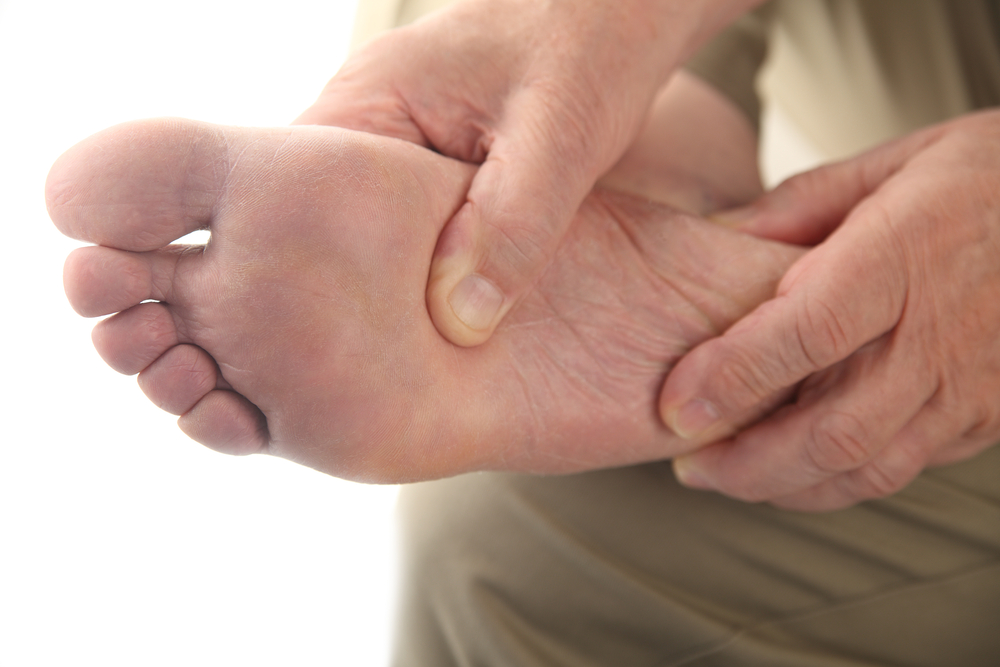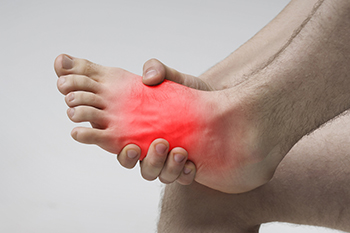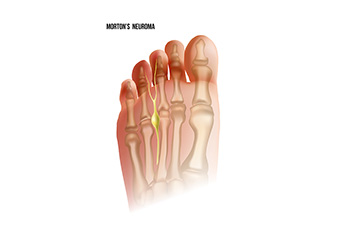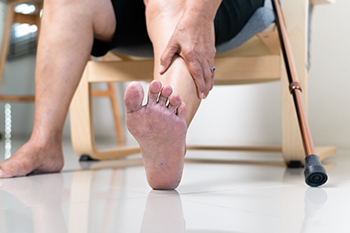Merrillville, IN
Munster, IN
October 2023
The Importance of Podiatric Care Among Diabetics

Consulting a podiatrist for diabetic foot care is essential for individuals with diabetes. Diabetes can cause neuropathy, which is a loss of sensation in the feet, making it difficult for patients to feel injuries, blisters, or sores. This numbness can lead to unnoticed and untreated wounds, which can quickly become infected due to compromised immune responses often seen in diabetic patients. In addition to neuropathy, diabetes can cause poor circulation, making it harder for wounds to heal and increasing the risk of infections. If untreated, these infections can lead to ulcers and gangrene. If you have diabetes, it is strongly suggested that you make regular appointments with a podiatrist to maintain overall foot health and reduce the risk of foot complications.
Diabetic foot care is important in preventing foot ailments such as ulcers. If you are suffering from diabetes or have any other concerns about your feet, contact Ahmad Elsamad, DPM from The Institute of Foot & Ankle Reconstructive Surgery . Our doctor can provide the care you need to keep you pain-free and on your feet.
Diabetic Foot Care
Diabetes affects millions of people every year. The condition can damage blood vessels in many parts of the body, especially the feet. Because of this, taking care of your feet is essential if you have diabetes, and having a podiatrist help monitor your foot health is highly recommended.
The Importance of Caring for Your Feet
- Routinely inspect your feet for bruises or sores.
- Wear socks that fit your feet comfortably.
- Wear comfortable shoes that provide adequate support.
Patients with diabetes should have their doctor monitor their blood levels, as blood sugar levels play such a huge role in diabetic care. Monitoring these levels on a regular basis is highly advised.
It is always best to inform your healthcare professional of any concerns you may have regarding your feet, especially for diabetic patients. Early treatment and routine foot examinations are keys to maintaining proper health, especially because severe complications can arise if proper treatment is not applied.
If you have any questions please feel free to contact our offices located in Merrillville, and Munster, IN . We offer the newest diagnostic and treatment technologies for all your foot and ankle needs.
Causes of Foot Stress Fractures

Foot stress fractures, though they can happen to anyone, often have identifiable causes and risk factors. One of the leading causes of stress fractures is a sudden increase in activity. This increase can encompass frequency, duration, or intensity. It is particularly common among athletes pushing their boundaries, like marathon runners who ramp up their mileage too quickly. Changing the surface upon which you exercise is another factor to consider. Transitioning from a soft, forgiving surface like an indoor track or turf to a harsh, unforgiving one like a concrete sidewalk can place undue stress on the bones of your feet. Improper technique is a hidden enemy, as it can stem from other foot conditions, like blisters or bunions. When people adjust their gait to avoid pain or discomfort, they may inadvertently place extra stress on certain bones in the foot. Footwear matters more than you might think. Ill-fitting, flimsy, stiff, or worn-out shoes can contribute significantly to the development of stress fractures. It's not just athletes who need to be aware because even non-athletes can experience these injuries after walking extensively on uneven terrain, common during vacations. For more information on dealing with foot stress fractures, it is suggested that you make an appointment with a podiatrist.
Activities where too much pressure is put on the feet can cause stress fractures. To learn more, contact Ahmad Elsamad, DPM from The Institute of Foot & Ankle Reconstructive Surgery . Our doctor can provide the care you need to keep your pain free and on your feet.
Dealing with Stress Fractures of the Foot and Ankle
Stress fractures occur in the foot and ankle when muscles in these areas weaken from too much or too little use. The feet and ankles then lose support when walking or running from the impact of the ground. Since there is no protection, the bones receive the full impact of each step. Stress on the feet can cause cracks to form in the bones, thus creating stress fractures.
What Are Stress Fractures?
Stress fractures occur frequently in individuals whose daily activities cause great impact on the feet and ankles. Stress factors are most common among:
- Runners
- People affected with Osteoporosis
- Tennis or basketball players
- Gymnasts
- High impact workouts
Symptoms
Pain from the fractures occur in the area of the fractures and can be constant or intermittent. It will often cause sharp or dull pain with swelling and tenderness. Engaging in any kind of activity which involves high impact will aggravate pain.
If you have any questions please feel free to contact our offices located in Merrillville, and Munster, IN . We offer the newest diagnostic and treatment technologies for all your foot and ankle needs.
Symptoms of Morton's Neuroma

Morton's neuroma is a nerve condition in the feet, often causing discomfort and pain. The primary symptom is a sharp or burning pain typically felt between the third and fourth toes, but it can also extend to the ball of the foot. Individuals with Morton's neuroma may describe a sensation of having a pebble or lump inside their shoe. Additionally, many people experience numbness, tingling, or a feeling akin to standing on a fold in their sock. Pain tends to worsen with walking, wearing tight shoes, or putting pressure on the affected area. People may feel relief by removing their shoes or massaging their foot. These symptoms can be intermittent or chronic, affecting daily activities and quality of life. Recognizing these signs is essential for early intervention and appropriate management of Morton's neuroma. If you suspect you may have this condition, it is suggested that you seek medical advice from a podiatrist who can provide you with an accurate diagnosis and tailored treatment plan.
Morton’s neuroma is a very uncomfortable condition to live with. If you think you have Morton’s neuroma, contact Ahmad Elsamad, DPM of The Institute of Foot & Ankle Reconstructive Surgery . Our doctor will attend to all of your foot care needs and answer any of your related questions.
Morton’s Neuroma
Morton's neuroma is a painful foot condition that commonly affects the areas between the second and third or third and fourth toe, although other areas of the foot are also susceptible. Morton’s neuroma is caused by an inflamed nerve in the foot that is being squeezed and aggravated by surrounding bones.
What Increases the Chances of Having Morton’s Neuroma?
- Ill-fitting high heels or shoes that add pressure to the toe or foot
- Jogging, running or any sport that involves constant impact to the foot
- Flat feet, bunions, and any other foot deformities
Morton’s neuroma is a very treatable condition. Orthotics and shoe inserts can often be used to alleviate the pain on the forefront of the feet. In more severe cases, corticosteroids can also be prescribed. In order to figure out the best treatment for your neuroma, it’s recommended to seek the care of a podiatrist who can diagnose your condition and provide different treatment options.
If you have any questions, please feel free to contact our offices located in Merrillville, and Munster, IN . We offer the newest diagnostic and treatment technologies for all your foot care needs.
Congenital Foot Anomalies

Toe defects can be present at birth, known as congenital anomalies. These can range from incomplete formation to extra toes. One cause could be amniotic band syndrome, where strands from the amniotic sac entangle around the fetus, restricting growth. Polydactyly refers to toes, which can be fully functional or just a flesh nub. Syndactyly involves webbing or fusion of toes. In simple cases, only soft tissues are fused, but in complex cases, bones are also fused. These defects can also be part of genetic syndromes such as Apert syndrome. Diagnosis often involves ultrasounds before birth and X-rays after birth. Genetic testing may also be done, particularly if other family members have similar issues or a genetic syndrome is suspected. Treatment usually involves surgery to correct the defect or remove extra digits. Prosthetics may be used for missing toes. If your child has been born with extra toes, it is suggested that you make an appointment with a podiatrist as quickly as possible for the best treatment for your child that will help ensure growing up with little to no impact on their mobility.
Congenital foot problems require immediate attention to avoid future complications. If you have any concerns, contact Ahmad Elsamad, DPM of The Institute of Foot & Ankle Reconstructive Surgery . Our doctor can provide the care you need to keep you pain-free and on your feet.
Congenital foot problems are deformities affecting the feet, toes, and/or ankles that children are born with. Some of these conditions have a genetic cause while others just happen. Some specific foot ailments that children may be born with include clubfeet, polydactyly/macrodactyly, and cleft foot. There are several other foot anomalies that can occur congenitally. What all of these conditions have in common is that a child may experience difficulty walking or performing everyday activities, as well as trouble finding footwear that fits their foot deformity. Some of these conditions are more serious than others. Consulting with a podiatrist as early as possible will help in properly diagnosing a child’s foot condition while getting the necessary treatment underway.
What are Causes of Congenital Foot Problem?
A congenital foot problem is one that happens to a child at birth. These conditions can be caused by a genetic predisposition, developmental or positional abnormalities during gestation, or with no known cause.
What are Symptoms of Congenital Foot Problems?
Symptoms vary by the congenital condition. Symptoms may consist of the following:
- Clubfoot, where tendons are shortened, bones are shaped differently, and the Achilles tendon is tight, causing the foot to point in and down. It is also possible for the soles of the feet to face each other.
- Polydactyly, which usually consists of a nubbin or small lump of tissue without a bone, a toe that is partially formed but has no joints, or an extra toe.
- Vertical talus, where the talus bone forms in the wrong position causing other bones in the foot to line up improperly, the front of the foot to point up, and the bottom of the foot to stiffen, with no arch, and to curve out.
- Tarsal coalition, when there is an abnormal connection of two or more bones in the foot leading to severe, rigid flatfoot.
- Cleft foot, where there are missing toes, a V-shaped cleft, and other anatomical differences.
- Macrodactyly, when the toes are abnormally large due to overgrowth of the underlying bone or soft tissue.
Treatment and Prevention
While there is nothing one can do to prevent congenital foot problems, raising awareness and receiving neonatal screenings are important. Early detection by taking your child to a podiatrist leads to the best outcome possible.
If you have any questions please feel free to contact our offices located in Merrillville, and Munster, IN . We offer the newest diagnostic tools and technology to treat your foot and ankle needs.
Gout Pain Can Be Managed
Essential Foot Care For Elderly Individuals

As we age, proper foot care becomes increasingly vital for maintaining overall health and mobility. Elderly feet are more susceptible to issues ranging from arthritis and reduced circulation to thinner skin and diminished sensation. Essential foot care practices for the senior years can begin with inspecting the feet regularly for any cuts, sores, or changes in skin color or temperature. It is beneficial for any signs of infection or injury to be promptly addressed. Toenails should be trimmed but not too short to prevent ingrown nails. Moisturize feet daily to prevent dryness and cracking, but ensure the areas between the toes remain dry to prevent fungal infections. Choose shoes that fit properly and provide support and cushioning as well. Custom orthotic inserts can help with arch support and stability. Regular, gentle foot exercises can improve circulation and mobility. Prioritizing proper foot care can enhance the quality of life for elderly individuals, helping them stay active and independent. It is suggested to seek regular check-ups with a podiatrist who can diagnose and address foot issues.
Proper foot care is something many older adults forget to consider. If you have any concerns about your feet and ankles, contact Ahmad Elsamad, DPM from The Institute of Foot & Ankle Reconstructive Surgery . Our doctor can provide the care you need to keep you pain-free and on your feet.
The Elderly and Their Feet
As we age we start to notice many changes in our body, but the elder population may not notice them right away. Medical conditions may prevent the elderly to take notice of their foot health right away. Poor vision is a lead contributor to not taking action for the elderly.
Common Conditions
- Neuropathy – can reduce feeling in the feet and can hide many life-threatening medical conditions.
- Reduced flexibility – prevents the ability of proper toenail trimming, and foot cleaning. If left untreated, it may lead to further medical issues.
- Foot sores – amongst the older population can be serious before they are discovered. Some of the problematic conditions they may face are:
- Gouging toenails affecting nearby toe
- Shoes that don’t fit properly
- Pressure sores
- Loss of circulation in legs & feet
- Edema & swelling of feet and ankles
Susceptible Infections
Diabetes and poor circulation can cause general loss of sensitivity over the years, turning a simple cut into a serious issue.
If you have any questions please feel free to contact our offices located in Merrillville, and Munster, IN . We offer the newest diagnostic and treatment technologies for all your foot and ankle needs.








